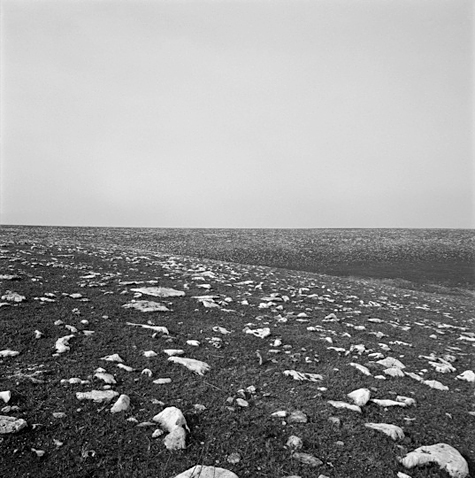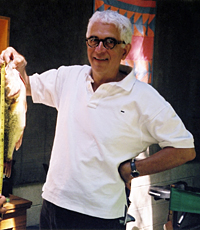
Joe Deal, Flint Hills (2006), from the series West and West. Carbon pigment print, edition of five. Additional images of Deal’s work at right.
Joe Deal, dean of the School of Art at Washington University in St. Louis from 1989-1999, died in hospice Friday, June 18, 2010, in Providence, R.I., following a long battle with cancer. He was 62.
Deal was among the most influential American landscape photographers of the latter 20th century, known for austere, almost abstract images that balanced depictions of the natural and man-made worlds.
His portfolio The Fault Zone (1981), for example, documented life along Southern California’s San Andreas Fault Line, juxtaposing the delicacy of desert ecosystems with the rigid yet ever-expanding geometry of suburban housing developments.
Other major series include Beach Cities (1978-1982), Subdividing the Inland Basin (1982-85), Site Documents (1986) and Topos (1998).

Deal
In addition to his duties as dean, Deal served as first director of Washington University’s Visual Arts and Design Center, a precursor to the Sam Fox School of Design & Visual Arts.
Formally dedicated in 2006, the Sam Fox School today encompasses the university’s art and architecture schools as well as the Mildred Lane Kemper Art Museum — all housed in a five-building complex that includes two new structures designed by Pritzker Prize-winning architect Fumihiko Maki.
“Joe’s stewardship was central to the development of the Sam Fox School, our new facilities, and, essentially, to the creation of my job,” says Carmon Colangelo, dean of the Sam Fox School and the E. Desmond Lee Professor for Collaboration in the Arts. “As an artist, a teacher and an administrator, he was greatly admired and will be sorely missed.”
Born in Topeka, Kan., in 1947, Deal was raised in Albany, Mo., and St. Paul, Minn. He earned a bachelor of fine arts degree from the Kansas City Art Institute in 1970 and both a master’s and a master of fine arts degree in photography from the University of New Mexico, Albuquerque, in 1974 and 1978, respectively.
Deal’s work first came to national attention in 1975 as part of the seminal exhibition New Topographics: Photographs of a Man-Altered Landscape at the International Museum of Photography, George Eastman House, in Rochester, N.Y. Signaling the emergence of a new approach to landscape photography, New Topographics emphasized conceptual rigor over romantic idealization and featured works that were more deeply attuned to the built environment.
In addition to displaying his own photographs, Deal, in his capacity as director of exhibitions for Eastman House, was a crucial adviser to curator William Jenkins in conceiving the show and also contributed to the exhibition and catalogue designs.
“Deal and other photographers whose work was brought together under the description ‘New Topographics’ recognized the increasingly threatened state of the American landscape, both physically and psychologically,” wrote art critic Robert Duffy, a longtime friend of Deal’s, in an obituary for the St. Louis Beacon. “They directed attention as well to a sense of ennui and hopelessness that characterizes so much of life in this fragmented post-modernist time.”
In 1976, Deal joined the faculty of the University of California, Riverside, where he taught photography and later served as an associate dean of the College of Humanities and Social Sciences before arriving at Washington University in 1989. From 1999-2005, he served as provost of the Rhode Island School of Design.
Deal received fellowships from the National Endowment for the Arts in 1976 and 1980 and from the John Simon Guggenheim Memorial Foundation in 1983. His photographs have appeared in exhibitions throughout the United States and abroad and have been the subject of numerous publications, including the monographs Joe Deal: Southern California Photographs 1976-86 (1992); Between Nature and Culture: Photographs of the Getty Center by Joe Deal (1999); and West and West: Reimagining the Great Plains (2009).
His work also has been featured in a series of photographic portfolios, most recently Indian Bingo (2009). His final portfolio, Karst and Pseudokarst, will be published posthumously by Nazraeli Press later this year.
Deal’s work is included in the collections of the Museum of Modern Art, New York; the Los Angeles County Museum of Art; and the Museum of Fine Arts, Boston, among many others. An exhibition of photographs from West and West is currently on view at the Center for Creative Photography at the University of Arizona, Tucson, where Deal’s archives will be housed. A re-creation of New Topographics will open at the San Francisco Museum of Modern Art in July.
Deal is survived by Betsy Sara Ruppa, his wife of 19 years; his daughter, Meredith Ivy Deal, of Boston; and his father, Percy H. Deal, of Albuquerque.
A celebration of Deal’s life will be held on campus during the fall semester. Details will be forthcoming.
In lieu of flowers, the family requests that contributions may be made to the Kansas State Foundation/Konza Prairie Research Excellence Fund.
Contributions also can be made to The Center for American Places at Columbia College Chicago, 600 South Michigan Avenue, Fourth Floor, Chicago, IL 60605-1996, attention: Kim Clement. In both cases, mention “In memory of Joe Deal” in the memo line.